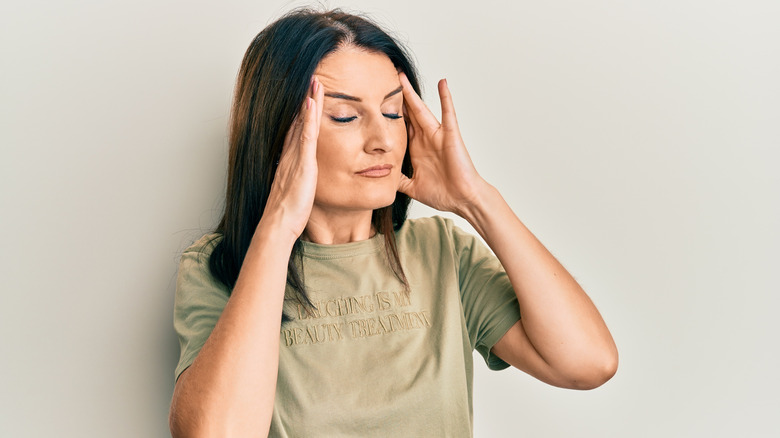What Are Keto Headaches And How Do You Prevent Them?
The keto diet involves eating low-carb, high-fat foods. However, this is a controversial eating plan that comes with many potential side effects, including painful headaches (via Verywell Health). Referred to as keto headaches, this uncomfortable side effect has several potential causes that all come from the keto diet. People who embark on this eating plan severely limit their intake of carbohydrates, which are turned into glucose in the body. Glucose is the main source of fuel for the brain. When you limit your carb intake, your body turns to its fat stores to find energy. This switch often causes blood sugar levels to drop, which can cause headaches.
The keto diet can also cause dehydration in people who first begin this change. Being on the keto diet often increases urination which can lead to dehydration if you do not continue to drink plenty of water. Finally, the keto diet causes your body to produce less insulin because of the drop in carbohydrate intake. This can cause your kidneys to excrete more sodium and lead to an electrolyte imbalance in the body. Both of these factors can lead to painful headaches.
There are a few ways to prevent keto headaches. If you decide to go on the keto diet, be sure to drink plenty of water to avoid dehydration. You should also try to get extra electrolytes in your system through food to avoid an electrolyte imbalance. Some of these foods include avocados, mushrooms, cashews, and leafy greens.
Is the keto diet effective?
Because the keto diet can lead to substantial weight loss for some people, you may be wondering if this diet is worth a try. According to Harvard Health Publishing, the keto diet is not ideal for most people. "The keto diet is primarily used to help reduce the frequency of epileptic seizures in children," said registered dietitian Kathy McManus, director of the Department of Nutrition at Harvard-affiliated Brigham and Women's Hospital. "While it also has been tried for weight loss, only short-term results have been studied, and the results have been mixed. We don't know if it works in the long term, nor whether it's safe."
The keto diet comes with many health risks. This eating plan is very high in saturated fat and has been linked with higher cholesterol levels. It is also easy to develop a nutrient deficiency if you are not eating plenty of fruits, vegetables, and grains. Because fruits, grains, and some vegetables are high in carbs, they are often neglected by people on this diet. The keto diet can also cause liver problems, kidney problems, constipation, mood swings, and brain fog. If you are thinking of going on the keto diet, be sure to speak with a dietician before you try it on your own.


